Backing Stuff Up:The Great Feminist Manga and Anime List: Revolutionary Girl Utena

This review is of Revolutionary Girl Utena or Shoujo Kakumei Utena and the movieAdolescence of Utena (which is essentially a loose retelling/reinterpretation of the show). I am not reviewing the Utena manga by Chiho Saito, as I have never read them (well, I tried, but couldn’t make it). By all accounts, the quality is lower and the themes and queerness are erased or watered down. Saito’s homophobic comments don’t impress me either.
These are difficult works to review because revealing the true greatness of the series would require basically spoiling the whole plot. Even discussing specific characters or facets, I can’t do them justice without spoiling everything, but I’ll do my best.
The reason Utena has this challenge is because it’s a series that messes with your preconceptions and subverts your expectations. Nothing is as it seems and every character has layers and issues and complexes that will be peeled back as it goes on. Expect heavy symbolism and heavy concepts.
But what I can say about this series is that it is eminently qualified for being part of this review because the entire premise is deconstructing gender roles, examining and criticizing misogyny and turning ism-filled tropes so common in fiction on their head. Also tons of queer characters and themes and commentary on racism as well. This is not just a deconstruction of shoujo- it’s a deconstruction of myth and fairy tale and human psychology in general, and it’s not just a surface look either. It will make you uncomfortable. And it will revel in doing so. I should also note it’s pretty much the only thing I’ve ever seen that sexualizes men just as much as women are generally sexualized. All in the name of deconstruction, of course.
The series revolves around Utena Tenjou and Anthy Himemiya, and it’s the relationship between these two girls that drives the show and the movie. Utena was orphaned at a young age, and she was visited by a prince who told her to hold onto her nobility and gave her a ring that would lead her to him. Since that day, Utena has been determined to not only find this prince, but model herself after him and become a prince who saves damsels herself. At Ohtori academy, she meets Anthy Himemiya, also known as the Rose Bride. Anthy will be engaged (i.e. become a slave) to whoever wins her in a duel, and the duelists happen to all wear the same kind of ring as the one Utena was given . Utena is determined to save Anthy from the other duelists and ends up engaged to her and embroiled in a strange battle…
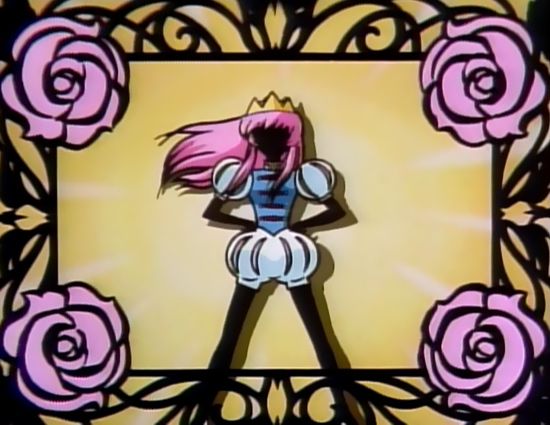
On the surface, it seems like a pretty standard idea- put a girl in the traditionally male role for shock and awe (but of course what she really desires and is inspired by is a man like any “ normal” girl), but keep those same old tropes of damsel in distress and masculine dominance intact. But the very concept of “damsel in distress” and the ideal of “prince on a white horse” are what are picked apart the most in Utena. Utena takes the standard sexist tropes of fiction and directly criticizes them.
For instance, the men in Utena at first glance are familiar romance hero cliches - freewheeling playboys who sweep women off their feet, ignoring the protests of their seducee and “taming” her, winning her over with singleminded pursuit and dramatic displays of their protectiveness and possessiveness. But Utena refuses to romanticize these men and shows the entitlement underneath the cliché- it shows the emotional damage these playboys do to the girls they use and discard, shows that possessiveness and ignoring protests is not rooted in love but a desire these men have manipulate, deceive and control women and mold them to their will. These men think of women as playthings, and when they cannot control a woman, they quickly become abusive. And the dubious consent situations in this series aren’t romanticized, but shown to be creepy and damaging. And a big part of Utena is about the main characters dealing with this entrapment, and fighting back.
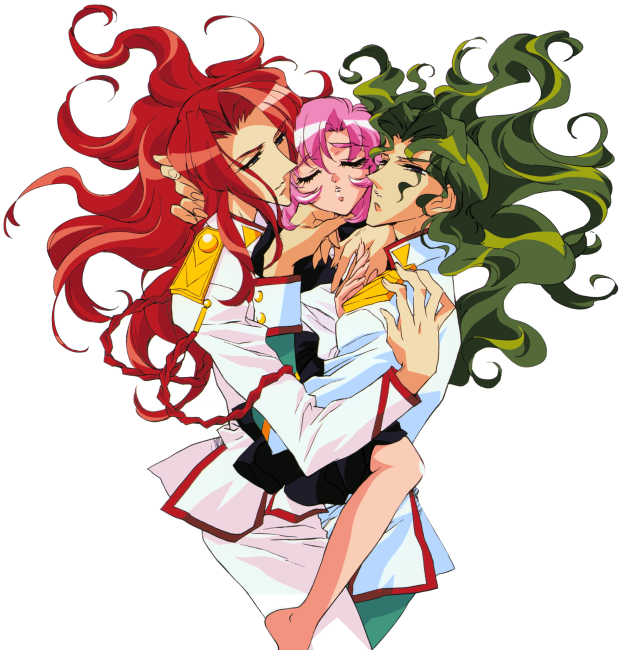
Utena herself is not let off the hook for willingly participating in this system that treats women like objects, even if she has good intentions, and she slowly learns the dangers of blindly believing in a princely ideal. Internalized misogyny is a theme. Victim-blaming is also a huge theme in the show, and it is thoroughly examined. Everyone blames Anthy for her situation without understanding what’s going on, including Utena herself and this comes back to smack them in the face. The cycle of abuse and whether it can be broken out of is an undercurrent to every facet of the show. The madonna/whore dichotomy is addressed as well as the inherent misogyny in myth- a girl who is not a princess is destined to become a witch. Sexual double standards, sexual abuse, paternalism, silencing and propaganda- all are examined, both through metaphor and dialogue.
Race is also an important factor in this anime as well. The Prince that inspires Utena and is considered the symbol of Good is dark-skinned. Anthy and her brother are also both dark skinned- her ethnicity is uncertain, though Anthy’s bindi suggests she might be Hindi. And I think Anthy being a dark skinned PoC was a deliberate choice. This is a girl who people alternately hate, victim-blame, abuse, treat as an object to possess, trample on and exploit. As a darker skinned-woman, Anthy is expected to take on all these burdens and support everyone and yet is treated worse than anyone, and that is very deliberate commentary. Utena’s attitude of wanting to save her to appease her desire to be a noble prince and the lack of thought she gives to Anthy’s point of view is very similar to the white-savior attitude a lot of Western feminists can have toward women of color (though of course Utena isn’t white but Japanese).
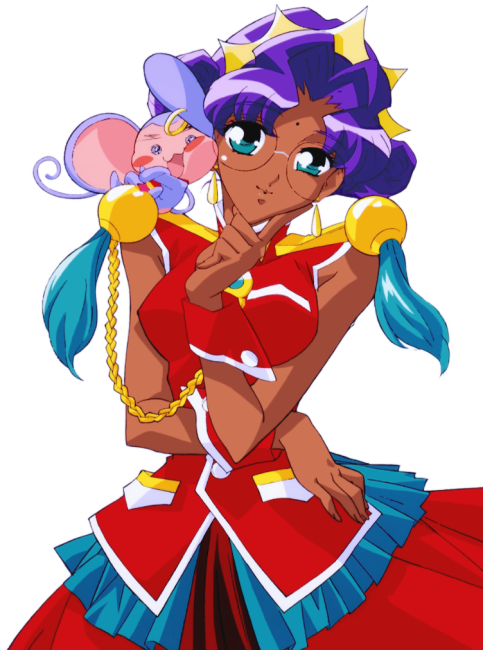
But Anthy is no simple victim or damsel in distress. Anyone who thinks she is missed the entire point of this show. I also find her to be one of the most layered and fascinating characters in all of anime. She’s definitely one of my favorites. The Anthy everyone sees- or rather wants to see- is a mask for her own protection. She’s capable of doing awful things in reaction to her abuse, but she’s also capable of being incredibly brave and heroic. To me,Utena is as much her story and journey just as much as Utena herself’s, she changes and develops just as much. The question of the show really isn’t “can Utena save Anthy”- it’s whether both girls can save themselves. And that’s all I can say about that.
I can’t really talk about Anthy’s brother without spoiling anything, sadly. Some may find him problematic, though he’s got a pretty complex history himself. In addition, I wouldn’t blame anyone who is too triggered and disgusted by how Anthy is treated by the other characters that they can’t sit through the anime to watch her character unfold, or to see the layers of the stories unfold. It certainly is a valid opinion to say how Anthy is presented isn’t worth it, even in the name of deconstruction.
In fact, trigger warnings for these works are pretty infinite. There’s no bloody violence (or blood at all really) or graphic images in general, and things are generally handled with subtlety, but that’s about it. Rape, incest, any kind of abuse you can name- it’ll be examined in spades. Any fucked up thing you can think of, it’ll probably come up. This is not for the easily disturbed. And as far as size and weight go, all of the characters are impossibly thin, and Utena even insults another girl by yelling about her “fat piggy legs” in a filler episode (though in that episode she also acted angry at being called a “boy-girl” and then in a filler a few episodes later, merely acted confused and like she’s never heard the term when she was insulted the same way. Her characterization could be inconsistent in fillers, is what I’m sayin). There’s no disabled representation, also.
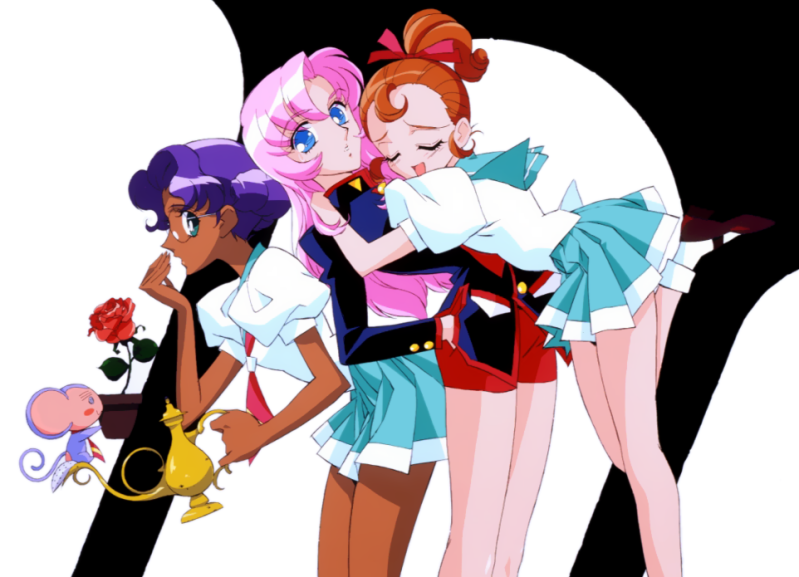
Now to talk about the queer themes in Utena, which are a major part of the narrative. There are canon queer characters in both the show and movie. Both works have a lesbian character who is probably one of the most noble people in the story, and a lot of her arc is tied up in how she has to keep her feelings locked away. The object of her affections is undoubtedly also infatuated, but is so enraged by her feelings and the feeling this girl will always outshine her, she can only hurt and manipulate the other girl. Basically, like every relationship in Utena, it’s complicated and dripping with broader meaning. There’s also the fact that the show has acts that are very obviously metaphors for sex, and men are shown doing them together. And being in bed together while shirtless. And rubbing each others chests and taking pictures of each other shirtless. Basically, everyone in this show is queer.
But the most important thing is that Anthy and Utena’s relationship which, as stated, drives both the show and the movie. The show is pretty heavy on the subtext between them- they’re engaged, they sleep together and hold hands, they do most of the sex metaphor things together and the credits even show them kissing just out of frame (Here’sthe picture shown and here’s the full picture that was drawn for the credits). But Utena insists to anyone that will listen she is totally heterosexual. In retrospect, I think character development-wise it makes sense they didn’t explicitly enter a relationship in the show- Part of Utena’s character is she’s really focused on being “normal” and hetero-normative. She wouldn’t be ready for that, and neither of them were really healthy enough to be truly romantic with each other.
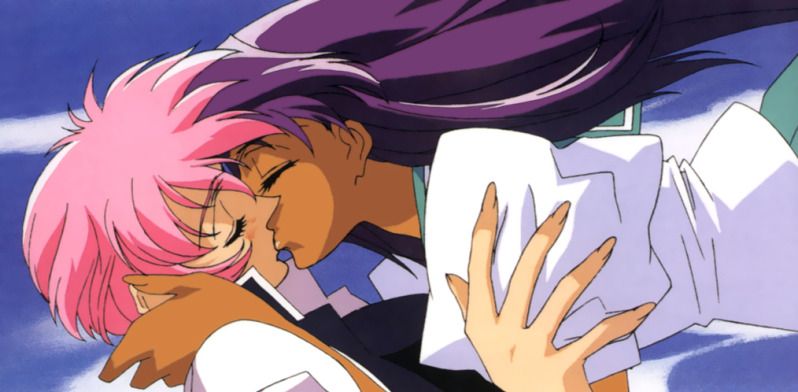
But the movie totally throws subtext out the window, and it becomes text. Both Anthy and Utena are a bit more comfortable with themselves than in the show, and also, the director was given free reign. So, Anthy and Utena kiss all the time in the movie. Sometimes naked! So yes, The Adolescence of Utena (and really Revolutionary Girl Utena too)is a complicated love story between two women, one of whom is a dark-skinned PoC, learning to accept and understand each other and fighting back against an oppressive patriarchal system that seeks to confine them. Also, as you’ve undoubtedly heard, there are car races and sword fights and stuff. If this is not enough to convince you that Utena is a great story to get into, I don’t know what is.
Women and Gender: 5 stars for a complex examination of misogyny gender roles and excellent female leads!
Race and Culture: I’m not sure I’m really qualified to say this at all with things so…complicated and potentially problematic, but I think there are layered and multi-dimensional darker skinned characters and also some solid commentary on racism, so 4 to 5 stars, your mileage may vary?
LGBTQ: 5 stars- complicated queer characters and queer relationships drive this narrative
Size and Weight: 1 star, 2 stars disregarding the piggy legs comment.
Disability: 2 stars